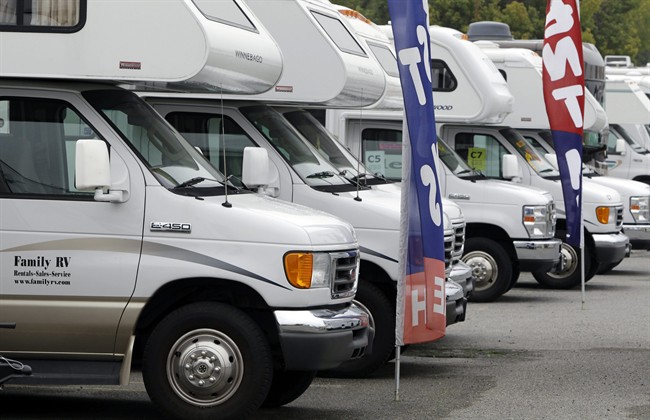The Canadian Taxpayers Federation (CTF) is adding its voice to the chorus calling for ICBC to be opened to competition.

The group has launched a new campaign calling for ICBC to be transformed into a driver-owned co-op, and to scrap a rule that requires B.C. drivers to buy their basic insurance coverage from the public insurer.
The group unveiled new numbers on Thursday regarding the cost of coverage for recreational vehicles and campers that it says are indicative of how B.C. drivers are being overcharged.
WATCH: ICBC under fire for highest premiums in Canada

It says it obtained quotes from ICBC and private insurers in Alberta for coverage on an 18-year-old Class-C camper van for a driver with a clean record.
A driver in B.C. would pay $1,400 per year, it said, while the same driver would pay $400 in Alberta.
“There’s only one reason for that, and that’s because ICBC is the only place to go,” said spokesperson Kris Sims. “They are a forced government monopoly.”
READ MORE: Of 3.3 million drivers, ICBC gives top discounts to 2.6 million of them. That could drop soon
Sims said B.C. drivers are paying the highest insurance rates in Canada, stacked on top of other affordability issues such as B.C. housing and Metro Vancouver gas prices.
“We want ICBC to change itself into a co-op similar to a credit union,” she said.
“Next to that new co-op they need to open that up to competition. People need to be able to choose their auto insurance. They need to be able to shop around and find lower rates.”
WATCH: ICBC says crashes in B.C. have hit all-time high

But ICBC says the CTF isn’t telling the whole story, and that the numbers the organization is working from lack context.
“The quote they provide for B.C. seems like for a person who chose to purchase a more comprehensive insurance package, whereas the Alberta one could very well be for someone who chose the bare minimum,” said spokesperson Joanna Linsangan.
READ MORE: ICBC rates should be jacked up on ‘risky drivers,’ say over 80% of British Columbians
She said it’s also difficult to compare B.C. to Alberta, citing B.C.’s longer RV driving season, larger population and different terrain. And she said B.C.’s system was designed to ensure all drivers have a minimum level of coverage for things like medical care and rehabilitation.
- Canadian man dies during Texas Ironman event. His widow wants answers as to why
- Several baby products have been recalled by Health Canada. Here’s the list
- Canadian food banks are on the brink: ‘This is not a sustainable situation’
- Invasive strep: ‘Don’t wait’ to seek care, N.S. woman warns on long road to recovery
“Whether you have a public insurance system or a co-op, the fact of the matter is, crashes are going up in B.C., and crash rates have a direct impact in what people pay for their insurance,” Linsangan said.
“Last year, we hit an all-time high of 350,000 crashes and the total cost claims was $4.8 billion.”
The CTF campaign launch comes a day after the Insurance Bureau of Canada (IBC) took aim at the ICBC, arguing drivers were paying significantly more than their peers in other provinces.
The IBC’s numbers showed the average British Columbian paid about $1,680 last year to ensure their vehicle, versus $1,251 in Alberta or $796 in Prince Edward Island.
READ MORE: ICBC rates should be jacked up on ‘risky drivers,’ say over 80% of British Columbians
ICBC is in the midst of a budget crisis, and lost more than $1.3 billion in the last fiscal year.
The province has unveiled a suite of reforms, including limiting payouts on soft tissue injuries and moving cases from the courts into B.C.’s Civil Resolution Tribunal.
The NDP government has also said it wants to reform ICBC rates so that risky drivers pay more.








Comments